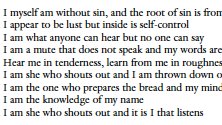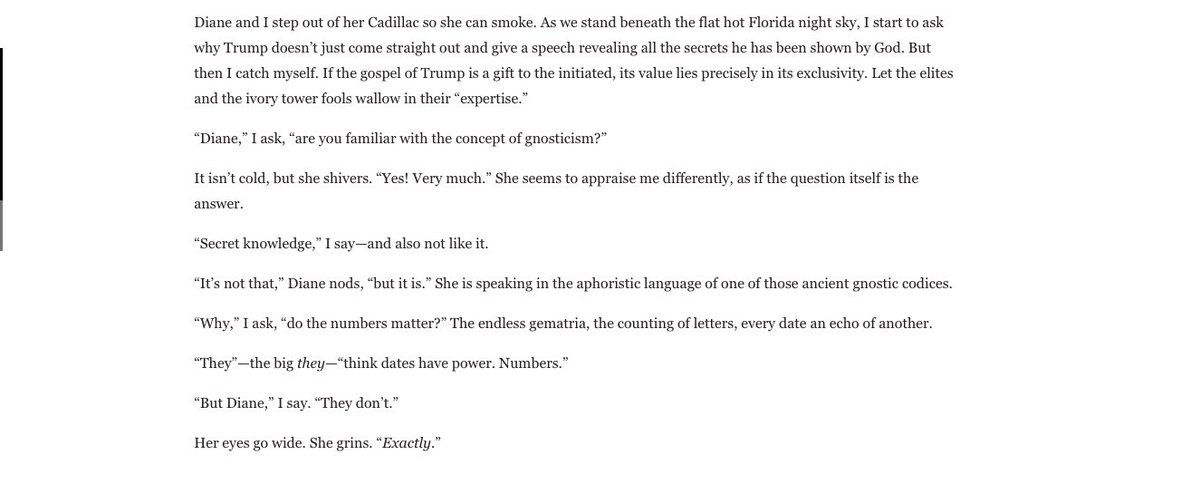I love @JeffSharlet& #39;s work - he& #39;s an incisive journalist of religion in the US. Because I& #39;m a historian of early Christians, tho, let& #39;s talk about the trope of Gnosticism he uses in this article. (super long thread 1/23) https://www.vanityfair.com/news/2020/06/inside-the-cult-of-trump-his-rallies-are-church-and-he-is-the-gospel">https://www.vanityfair.com/news/2020...
In this piece, Sharlet uses what he calls "Gnosticism" as a comparative frame to study the Trump rallies he attended in 2020 and the in-depth conversations he had with folks there. (2/23)
Sharlet& #39;s work isn& #39;t just smart - it& #39;s gorgeous and evocative. (Follow his instagram for a treat.) In this piece he weaves in poetic bits from "Gnostic" texts like the Gospel of Thomas and Thunder: Perfect Mind as parallel to the odd things Trump supporters say. (3/23)
Thunder, an ancient Coptic poem (prob translated from Greek!), is a series of paradoxes, an elaborate fan dance in which a feminine figure - divine? - both reveals and hides herself. Sharlet juxtaposes this with Trump, also "a series of contradictions." (4/23)
Here& #39;s an excerpt from my favorite translation, from 2010, by a group of scholars including @maiakotro, H. Taussig, C. Lillie, J. Calaway, J. Lasser. (5/23)
(bonus: the prada commercial inspired by it, directed by SIR ridley scott! (6/23) https://www.youtube.com/watch?v=8hvB_2ElxaM">https://www.youtube.com/watch...
Sharlet doesn& #39;t insinuate that Trump *is* such a divine bundle, merely that supporters see him as such as a way of squaring his hypocrisy. But I bit my lip here, where Sharlet wonders if "Gnostics" would& #39;ve seen Trump that way too: (7/23)
And here, with Sharlet& #39;s standout informant Diane, a woman who& #39;s left her church and found new kin here at the rallies and in QAnon: (8/23)
There& #39;s a lot to say here, and I& #39;m sure friends and colleagues will fill out my replies with wisdom (lol it& #39;s almost a joke bc gnosis means wisdom, get it?!). As for me: Let me tell you why I& #39;m scare-quoting "Gnostic." (9/23)
"Gnosticism" evokes a constellation of mystery, esoterica, neo-Platonism, secret knowledge (gnosis) passed down to a select few, a panoply of spiritual rulers, bodyphobic dualism, and heresy. Sharlet calls it "the path Christianity didn& #39;t take." It& #39;s hard to define (10/23)
Irenaeus (late 2nd c. CE) was a vocal opponent of people he called "gnostikoi." They got Christianity wrong, he said, and set out to correct them. For a long time, this work (Against Heresies) was the most detail we had on the gnostikoi: an enemy& #39;s account of the knowers (11/23)
People kept this view: "orthodox" Christianity diametrically opposed to "heretical" Gnosticism. But this ignores the rich spectrum of practices and beliefs in the first few centuries of Christianity, as people were building the tradition. (12/23)
In 1945, that plurality leapt into view when 13 codices were found in Egypt - the Nag Hammadi codices. This 4c collection was categorized as Gnostic, when they could have just as easily been called early Christian. After all, they used Christian motifs, characters, themes... (13
They also show us some interesting stuff that didn& #39;t make it into the dominant cut - different heroes (Mary Magdalene, Thomas); different powers (Demiurge, the Mind); different organizing metaphors (sexual union; plants and roots; ladders to heaven) (14/23)
The point is, to put it flippantly, Gnosticism didn& #39;t exist. It& #39;s a category scholars use to put certain ancient stuff in a box we can pull down from a shelf to examine. We could& #39;ve put different stuff in the box or written something else on the box in sharpie, but we didn& #39;t. (15
It& #39;s not a useless label - the things are in the box for a reason - but you& #39;ve gotta remember "Gnosticism" is the label for the box, not the things in the box. When scholars forget this, they get an orientalist, oversimplified myth (16/23)
Anyway: in some ways Sharlet& #39;s right! This stuff does feel weird, secretive, anti-establishment. The categ "Gnosticism" was designed to evoke those feelings! But he& #39;s not referencing historical reality (17/23)
As K. King says in /What Is Gnosticism/, though, "the interesting issue is not that [terms like Gnosticism] are artificial constructs but rather how they are constructed and to what ends" (3). (...this is an excellent book) (18/23)
So in this moment, this weird new chapter in Gnosticism& #39;s life, how& #39;s Sharlet constructing it? To what ends? Like for Irenaeus, for Sharlet Gnosticism is a term that solidifies his target so he can systematize it, understand it, and then perhaps destabilize it (19/23)
It makes sense to me that this strategy is attractive to Sharlet, a tremendously empathetic journalist. He strives to understand the human in his subjects - but not without showing their fragility, their errors, their dangers. (I don& #39;t presume the same of Irenaeus, lol) (20/23)
I like watching this rhetoric flow, but it worries me, to be honest. I *don& #39;t* think "the gnostics would have especially appreciated the most absurd Trumpian paradox: He sits at the heart of power, even as he proclaims himself an outsider" (21/23)
Part of my discomfort is bc those gnostics didn& #39;t exist. Part of it is bc - imo - these people wouldn& #39;t look at Trump with appreciation. The fragments we call "gnostic" show sensitivity to corrupt earthly power, a distrust of passion, a hope that "all will return to its root" (22
("All will return to its root" always lands in my ears like a wish that the earth will be tucked back into bed)
But like, who knows what the "Gnostics" would appreciate, right? We& #39;re always inventing them. I just invented more of them. It& #39;s why + how that& #39;s interesting. (23/23)
But like, who knows what the "Gnostics" would appreciate, right? We& #39;re always inventing them. I just invented more of them. It& #39;s why + how that& #39;s interesting. (23/23)
(this thread brought to you by @Sacred_Writes! for more smart people thinking "how & why to categorize folks in ancient religion" see @GregGiven @maiakotro @drewjakeprof @AnnetteYReed @BlossomStefaniw ... + tons of others who i welcome to tag in)

 Read on Twitter
Read on Twitter




